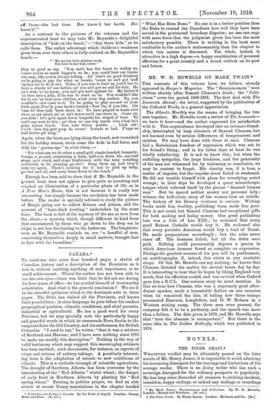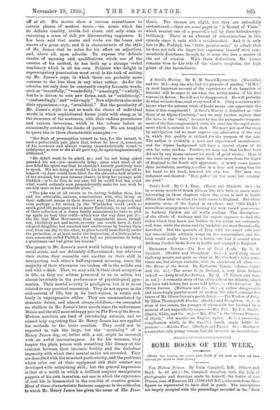NOVELS.
THE FINER GRAIN:f
WHATEVER 'verdict may be ultimately passed on the later novels of Mr. Henry James, it is impossible to avoid admiring his increasing disrespect for the cravings and limitations of the average reader. There is no living writer who has such a sovereign disregard for the ordinary passports to popularity. He has long since discarded all recourse to striking incident, sensation, happy endings, or indeed any endings or roundings • My Mark Twain! Reminiscences and Criticisms. By W. D. Howells. London : Harper and Brothers. [6s. net.]
t The Finer Grain. By Henry James. London : Methuen and Co. [68.]
off at all. His stories show a curious resemblance to certain phases of modern music,—the music which has no definite tonality, avoids full closes, and only aims at conveying a sense of rich yet disconcerting vagueness. It has been said that nouns and verbs are the bones and sinews of a great style, and it is characteristic of the style of Mr. James that he relies for his effect on adjectives, and, above all, upon adverbs. To express the delicate shades of meaning and qualifications which are of the essence of his method, he has built up a strange verbal machinery which is all his own. Printers who delight in supererogatory punctuation must revel in the task of setting up Mr. James's copy, in which there are probably more commas to the line than in any other author, As for the adverbs, not only does he constantly employ favourite words, such as "beautifully," "wonderfully," "amazingly," "awfully," but he is driven to coin new forms, such as " exhibitively," " confoundingly," and " relievingly." New adjectives also make
their appearance,—e.g., " invalidieal." But the peculiarity of
Mr. James's style is not so much the choice of individual words, in which sophisticated forms jostle with slang, as in the structure of the sentences, with their endless parentheses and curious inversions, which in the volume before us occasionally outstrip the limits of parody. We are tempted to quote two or three characteristic examples :-
"Her flush of presumption turned in fact, for the instant, to such a pathetically pale glare that, before he knew it, conscious of his resources and always coming characteristically round to indulgence as soon as she at all gave way, he again magnanimously abdicated."
"He didn't want to he asked, no ; and his not being asked guarded his not—yes—positively lying ; since what most of all now filled his spirit was that he shouldn't himself positively have to speak. His not doing so would be his keeping something all to himself—as Jane would have liked, for the six-and-a-half minutes of her strained, her poor fatuous chance, to keep her passage with Puddick ; or to do this, in any case, till he could feel her resist what would certainly soon preponderantly make for her wish to see him stare at her producible plum."
"The joke was at all events in its having befallen them, him and his admirable, anxious, conscientious wife, who, living on their sufficient means in their discreet way, liked, respected, and even perhaps a bit envied, in the Wimbledon world (with so much good old mahogany and so many Bartolozzis, to say nothing of their collection of a dozen family miniatures) to have to pick up again as best they could—which was the way Jane put it— the life that Miss Montravers, their unspeakable niece, though not, absolutely not and never, as every one would have it, their adopted daughter, had smashed into smithereens by leaving their roof, from one day to the other, to place herself immediately under the protection, or at least under the inspiration, of a little painter- man commonly called Puddick, who had no pretensions to being a gentleman and had given her lessons."
The people in Mr. James's novel world belong to a variety of
social strata, and are delicately differentiated ; but whatever their status, they resemble one another in their skill in interpreting each other's half-expressed meaning, since the majority of their utterances are broken off in the middle and end with a dash. That, we may add, is their chief occupation in life, as they are seldom presented to us in action, but almost invariably in the performance of psychological gym- nastics. Their mental activity is prodigious, but it is never related to any practical movement. They do not appear in the mid-current of life, but in its back-waters, or rotate end- lessly in unprogressive eddies. They are unencumbered by domestic duties, and almost always childless,—we remember
no children in Mr. James's later novels since the unfortunate Maisie and the still more unhappy pair in The Turn of the Screw. Modern novelists are fond of introducing animals, and we
cannot help regretting that Mr. Henry James has not applied his methods to the brute creation. They could not be expected to talk the lingo, but the " mentality " of a Henry James dog, or, better still, a• cat, might be invested with an awful interestingness. As for his humans, they inspire the plain person with something like dismay at the contrast between their intrinsic futility and the diabolical ingenuity with which their mental antics are recorded. They are described with the minutest particularity, and the problems which arise out of their equipment and their contact are developed with astonishing skill ; but the general impression is that of a world in which a brilliant conjurer manipulates puppets of his own intention, not one in which the experience of real life is transmuted in the crucible of creative genius. Most of these characteristic features reappear in the collection
to which Mr. Henry James has given the name of The Finer Grain. The themes are slight, but they are splendidly orchestrated,—there are some pages in " A Round of Visits" which remind one of a peacock's tail by their kaleidoscopic- brilliancy. There is an element of sensationalism in this- episode since it ends with a revolver-shot. And it is only fair to Mr. Puddick, the "little painter-man," to admit that he does not talk the lingo, but expresses himself with com- mendable directness, though he is none the less a master of the art of evasion. With these deductions, Mr. James remains true to his role of the elusive magician, the high priest of the inconclusive.



































































 Previous page
Previous page